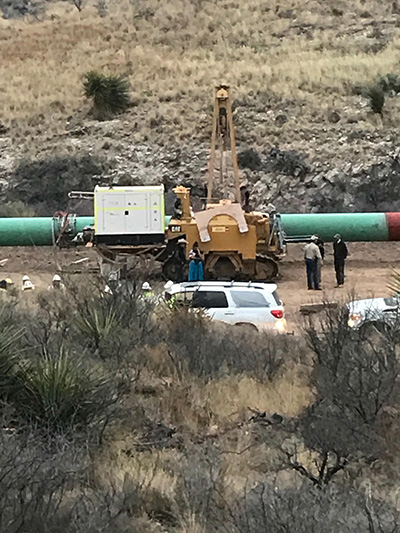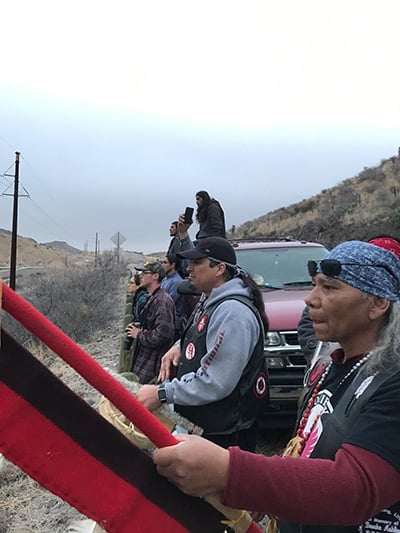
Part of the Series
Planet or Profit
Marfa, Texas—A new Indigenous-led direct action campaign is gaining momentum with two more lockdown actions targeting Energy Transfer Partners’s (ETP) twin pipeline projects in far West Texas.
An Indigenous Water Protector and an Alpine resident were arrested Saturday, January 14, after locking themselves to pipe-laying equipment at an ETP easement and work site in Presidio County, Texas. The lockdown disrupted construction on the company’s 148-mile Trans-Pecos Pipeline that, if completed, would carry 1.4 billion cubic feet of fracked gas from West Texas to Mexico every day. A third Protector, who was not locked to the equipment, was also arrested at the site.
The action was the second to be organized by the new “Two Rivers” Indigenous-led prayer and resistance camp on private land in West Texas’s pristine Big Bend region, and the third to target the Trans-Pecos Pipeline since December. The camp’s ongoing campaign is waged in solidarity with the Sacred Stone and Oceti Sakowin camps’ historic standoff against the Dakota Access Pipeline at the Standing Rock Sioux Reservation in North Dakota. The same Dallas-based company is behind both pipelines.

The two Water Protectors who locked down Saturday are Lori Glover, co-founder of the Big Bend Defense Coalition, and a member of the San Antonio-based Society of Native Nations who is of Purépecha descent, and preferred not to be named. Both organizations have been working to organize the Two Rivers camp in recent weeks. Glover was charged with criminal trespassing and criminal mischief, a state jail felony. The Protector who did not lock down was also charged with criminal trespassing. The Protector from the Society of Native Nations, an Indigenous woman, was not charged, and was released Saturday evening. The other two Protectors were both released on bond the following day.
Glover told Truthout that Presidio County deputy sheriffs forcibly removed her and her partner from their locking device, yanking on the Indigenous Protector’s arm so forcefully that it caused her to scream and cry out in pain. Glover says the officers bruised and hurt both of them in the process of trying to pull them out, and threatened to use a stun gun on Glover at one point but didn’t.
“After they finally dragged me out of there, and handcuffed me and put chains around my feet, then they yanked me back up, and the sheriff just started … talking about … religion. [Presidio County Sheriff Danny Dominguez] started asking me did I believe in God. And I said, ‘I believe in the Spirit,’ and then I wouldn’t say anything, and then he said, ‘Answer me, … I’m talking about the God, the creator. Do you believe in that God?'”
Glover told Truthout she is planning to fight her felony charge in court, saying that the charges have been trumped up in order to scare the Water Protectors from engaging in further actions. “[The police] were very aggressive. We were peaceful the whole time. Because we didn’t do anything to the property, I don’t think that the charge they have chosen will stick,” she said.
Both the police presence and charges against the Water Protectors have escalated since the camp’s consecrating action, in which two Water Protectors locked down to pipe-laying equipment on Saturday, January 7, and were charged with trespassing. During the latest lockdown, officers with the U.S. Border Patrol assisted the Presidio County Sheriff’s Department in making the arrests.
Additionally, as the Two Rivers Water Protectors were awaiting news of Saturday’s arrestees’ booking statuses at the Marfa police station, a Presidio County deputy sheriff told the Protectors and this reporter that he and other county deputy sheriffs have been moonlighting as private security guards for ETP during their off hours. The Presidio County sheriff could not be reached for comment in time for the publication of this article.
Another Native Water Protector with the Frontera Water Protection Alliance who locked herself to machinery at a sister ETP pipeline, the “Comanche Trail” Pipeline, voluntarily unlocked under pressure and with only a formal warning, telling Truthout that El Paso County sheriffs threatened to arrest the other Native Water Protectors who were also on the work site if she didn’t voluntarily unlock.
“When the [El Paso County] sheriff came over, he told the Protectors that either we all leave or we all get arrested, and so at that point, I just unlocked because I had elders there that I had asked to come and pray with us, and I just didn’t want to feel responsible for them getting arrested,” said the Water Protector of Coahuiltecan descent, who asked not to be named. “I did it because I … hate that we continue to abuse [Mother Earth] by digging up death and contaminating ourselves with it, and poisoning ourselves with it. We’re just risking so much.”

The Two Rivers Water Protectors say they are protecting the Rio Grande River — which both Texas ETP pipeline projects would cross under — from contamination, as well as their sacred sites. Archeologists have already documented ETP’s destruction of archeologically significant Indigenous cultural sites to build the Trans-Pecos. The Native Water Protectors want a comprehensive Environmental Impact Statement conducted for the full lengths of both pipeline projects, as well as earnest consultation with Texas tribes, many of which remain unrecognized by the state and federal governments. They are also opposed to the pipeline’s destruction of critical habitat and the condemning of land by eminent domain.
“The Rio Grande is like in North Dakota, [the Missouri River] that they’re fighting for over there,” said Pete Heflin, a member of the Society of Native Nations and Water Protector with the Two Rivers camp. “[ETP] is destroying sacred sites and maybe some burial grounds, and they don’t have a concern about that. That’s what we’re doing here. We’re trying to stop them. We need answers. They need to be accountable. They think they don’t have to be accountable just because of who they are.”
Texas billionaire Kelcy Warren, the CEO of ETP, had previously agreed to meet with Heflin after Heflin confronted Warren during a Texas Parks and Wildlife Commission hearing. Warren was appointed to the commission by Texas Gov. Greg Abbott through 2021, and Heflin confronted him about the destruction of sacred sites at the Standing Rock Sioux Reservation in North Dakota and the Trans-Pecos Pipeline. After agreeing to meet with him, Warren later reneged, saying he wanted to meet with Heflin in private, and not agreeing to any allow any transparency measures.
The Two Rivers’ Water Protectors are working with Indigenous leaders at Standing Rock. An Indigenous Environmental Network delegation from Standing Rock is planning to meet with the Native Water Protectors at the Two Rivers camp this month to engage in prayer and ceremony, and to provide additional training to the camp’s new Protectors as they anticipate new growth in the coming weeks.
Join us in defending the truth before it’s too late
The future of independent journalism is uncertain, and the consequences of losing it are too grave to ignore. We have hours left to raise the $12,0000 still needed to ensure Truthout remains safe, strong, and free. Every dollar raised goes directly toward the costs of producing news you can trust.
Please give what you can — because by supporting us with a tax-deductible donation, you’re not just preserving a source of news, you’re helping to safeguard what’s left of our democracy.